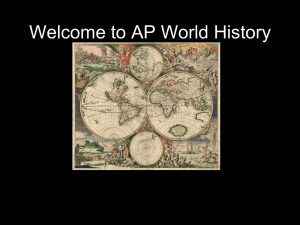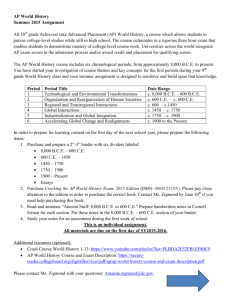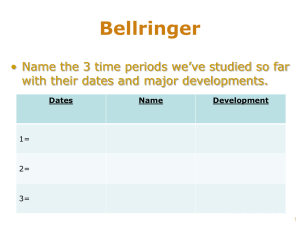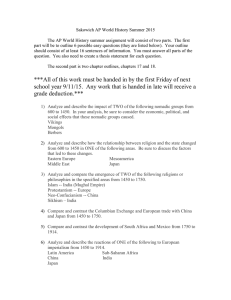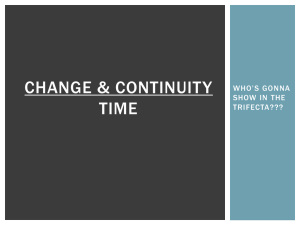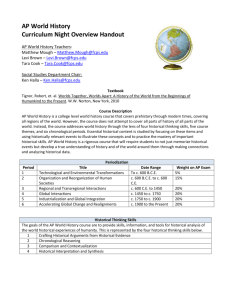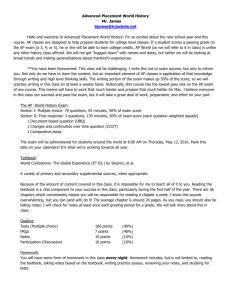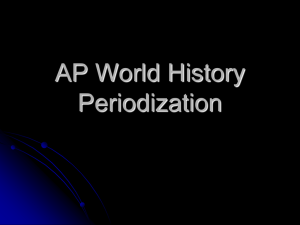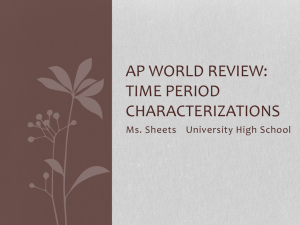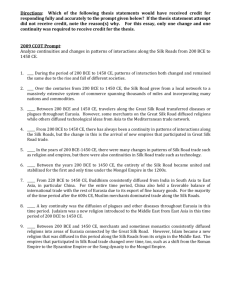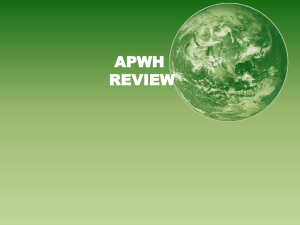File - AP World History
advertisement
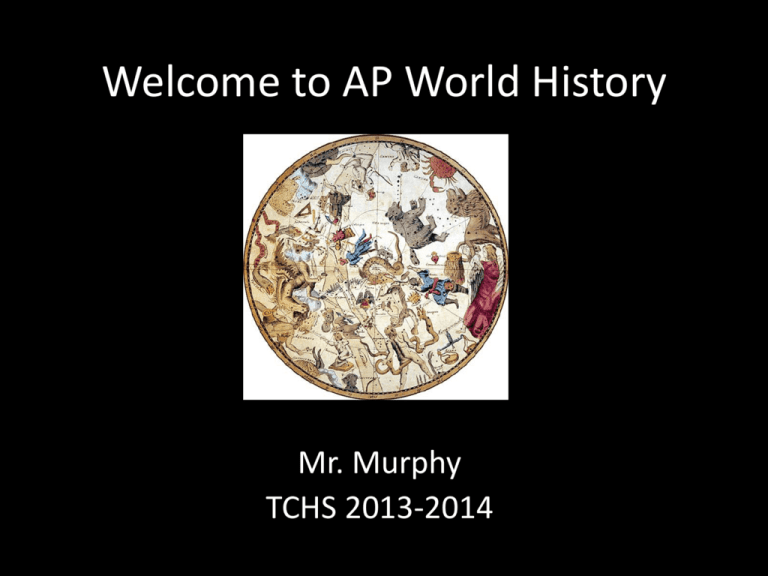
Welcome to AP World History Mr. Murphy TCHS 2013-2014 What is the AP (Advanced Placement)? • The AP, or Advanced Placement, is a college-level course. Through college-level coursework and exams, students can earn college credit by taking the AP Exam. • The AP Exam is given at the end of the year and depending on your grade and the university you attend, your test score can count for college credit. Why take the AP? • You can get a head-start on college! • If you pass the AP Exam, you won’t have to take or pay (and college is expensive) for the courses you’ve taken. • It looks great on college applications. • You will gain skills that will help you be successful in college. What should I expect this year in AP World History? • - Expect to work incredibly hard. • - Expect to improve your writing skills and sharpen your problem-solving techniques. • - Expect to engage in intense discussions, solve problems collaboratively, and learn to write clearly and persuasively. • - Expect to learn test-taking strategies that will help you be successful on the AP Exam. • - Expect to learn… A LOT. What does the AP Test look like? • Three hours and five minutes • 70 multiple choice questions – Worth 50% of the AP Exam grade – 55 minutes long • 3 essay questions – Worth 50% of the AP Exam grade • DBQ- Document Based Essay Question – 40 minutes long • Continuity and Change Over Time Essay – 40 minutes long • Comparative Essay – 40 minutes long • The AP World History Exam will take place on Thursday, May 15th Where can I find good resources to prepare for this course? • collegeboard.com website – - Find World History under Courses and Exams – - Here you can find outlines, sample questions and past essay questions and scoring guidelines • The Class website http://982000493791090370.weebly.com/ What are good study guides I can find? • • • • - Cracking the AP World History Exam by Princeton Review - 5 Steps to a 5 AP World History by Peggy Martin - Kaplan AP World History by Jen Laden and Patrick Whelan - iTunes – Good podcasts, lectures, study cards, and other resources you can download for free. Also… • - This course will be your primary resource to passing the AP Exam. However, I cannot cover it all, so you must read your book. • - There are many good resources outside of this class. Many of them you can get for free by going to the public library or by going on the internet. AP World History 1) Course was created in an effort to look at the world as an interrelated system, rather than looking at how Europe imposes itself upon the rest of the world (Euro-centric) 2) Follows current historical scholarship 3) Examines 5 different geographical regions, 6 different time periods, and 5 different themes (SPICE) 4) Focuses more on comparisons, connections, trends, themes rather than details. THE WHERE 1) Americas 11 Five Regions 2) Africa 3) Europe 4) Asia 5) Oceania Each region will be 20% of the course THE WHEN Time Periods 1) 8,000 BCE – 600 BCE 2) 600 BCE – 600 CE 3) 600 CE – 1450 CE 4) 1450 CE – 1750 CE 5) 1750 CE – 1900 6) 1900 - present 13 CED Periods/Eras Era Dates (c.) % of ?s 8,000 – 600 BCE 5% 2. Organization and Reorganization of Human Societies 600 BCE – 600 CE 15% 3. Regional and Transregional Interactions 600 – 1450 20% 4. Global Interactions 1450 – 1750 20% 5. Industrialization and Global Integration 1750 – 1900 20% 1900 – present 20% 1. Technological and Environmental Transformations 6. Accelerating Global Change and Realignments THE WHAT Themes 1) Social 1) Gender, family, race, ethnicity, classes 2) Political 1) Governance, empires, nations, revolts and revolutions 3) Interactions with the environment 1) Disease, migration, settlements, technology 4) Cultural 1) Religion, philosophies, science, arts, architecture 5) Economic 1) Agriculture, production, trade, commerce, labor, industry 16 So what is AP World History? • Global and Comparative Integration – Spatial: Compare regional events to global. – Temporal: Compare events through multiple eras Historical Thinking Skills Name of Skill (Prerequisite) Content Knowledge Description Deep Knowledge of a great deal of information— names, chronology, facts, events, etc. 1.Crafting Historical Arguments From Historical Evidence 2Chronological Reasoning 3Comparison and Contextualization 4. Historical Interpretation and Synthesis In conclusion… • - Please remember that we will be working hard this year. • - You will need to devote a lot of your time to your homework and to studying outside of this class. • - The AP Exam is 286 days away! We have a lot of work to do until then. • - Any questions?
